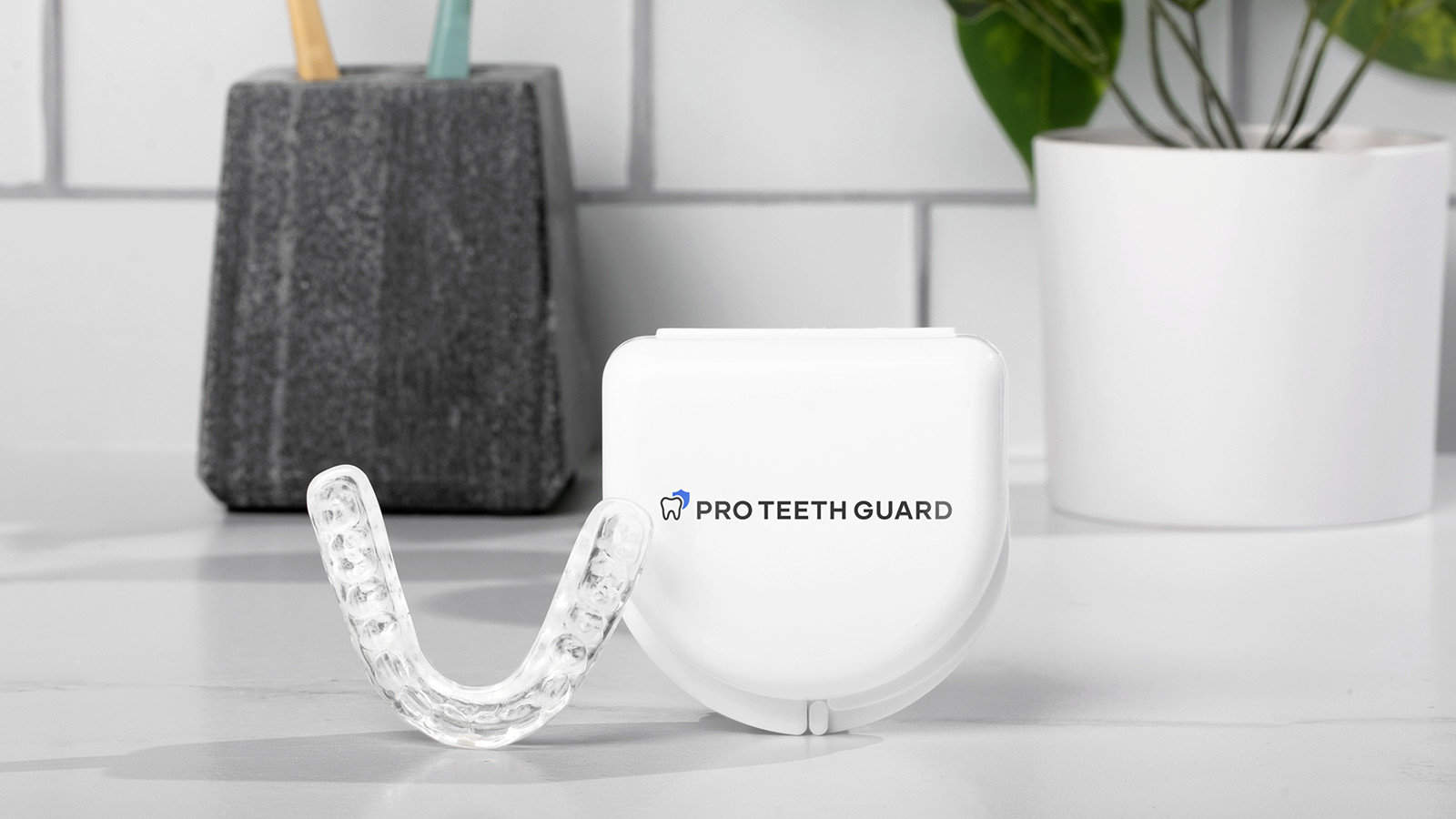Night guards are incredibly helpful in shielding against dental woes such as bruxism, but it’s unpleasant if they turn yellow. Discoloration occurs due to diverse reasons. It can be the residue from meals, beverages like coffee or tea, and subpar upkeep. Though this tint doesn’t impair function, maintaining hygiene is vital to ensure cleanliness.
Proper maintenance not only ensures hygiene but also extends the night guard’s efficacy for optimum results. Having hands-on experience with night guards over the years of using them, I will specify the reasons why night guards get discolored and suggest effective cleaning methods to combat the issue.
Table of Contents:
Reason Your Mouth Guard Turns Yellow
Have you ever dropped your night guard and noticed it gradually turn yellow? That’s what happened to me once. It was a clumsy move, and later on, my indispensable night guard looked different. Turns out, dropping it prompts bacteria accumulation, changing its color. Other reasons, such as contact with food and drinks, like coffee, can also cause discoloration of the night guard. Let’s explore why is your nightguard turning yellow and what you can do about it.
Bacteria Build-up
The staining of a night guard owing to bacteria buildup is a consequence of the same bacteria responsible for plaque, tooth decay, and unpleasant breath. If you don’t clean your night guard properly, it allows mouth-based bacteria to migrate onto the night guard’s surface, fostering plaque and tartar accumulation.
As a result, the bacteria buildup triggers yellow or white stains on the material. Moreover, saliva exposure and calcium deposits from teeth further contribute to the night guard turning yellow. To avert such bacteria-induced discoloration, diligent cleaning, proper storage, and regular maintenance are necessary.
Visible Damage
When a night guard suffers damage, be it scratches, cracks, or bite marks, it becomes a haven for bacteria and plaque to accumulate. These imperfections create ideal breeding grounds for bacteria, resulting in the mouth guard turning yellow.
As bacteria flourish, discoloration occurs, with varying impacts depending on the night guard’s material. For instance, rubber-type mouth guards, being more porous, tend to discolor faster over time compared to acrylic or harder plastic counterparts. If you are wondering why choose an acrylic night guard, durability and slower discoloration might be convincing reasons. Made of long-lasting material, acrylic night guards are best suited for individuals suffering from severe teeth grinding.
Improper Use
Improper use of a nightguard and poor hygiene can significantly impact its color. When a night guard isn’t adequately cleaned before use, bacteria from the mouth cling to its surface, fostering plaque and tartar buildup. This buildup results in yellow or white stains on the material. Leaving saliva to linger on the night guard for extended periods can also trigger a yellowing effect.
Neglecting proper oral hygiene, including insufficiently cleaning the guard daily, contributes to discoloration. Additionally, opting for low-quality materials in over-the-counter or stock sports mouth guards can also result in yellow stains. You can also be left dealing with teeth hurt after night guard if their shape is altered with plaque and tartar buildup.
Being Old
The age of a night guard might be yet another reason why it turned yellow. With prolonged use, wear and tear accumulate, leading to micro-damage and increased porousness in the material. This heightened porosity allows easier penetration of stains from food, drinks, and saliva.
As the guard ages, its ability to resist discoloration diminishes, resulting in the development of yellowish stains. Regular replacement helps maintain the effectiveness of the night guard and reduces the likelihood of discoloration due to aging.
What Considerations Are Necessary to Keep Your Dental Guard Clear?
Maintaining the clarity of your mouthguard demands attention to crucial considerations. Addressing various issues ensures its pristine condition. From cleaning routines to storage practices, each aspect plays a pivotal role.
Start with a Quality Product
Selecting top dental guards in the market is essential for maintaining clarity over time. Premium options like Remi and Pro Teeth products offer exceptional durability, minimizing the risk of premature yellowing. These custom mouth guards are designed for individuals with missing teeth or any feature unique to an individual’s oral cavity. Made of superior materials engineered to resist discoloration, these night guards ensure extended use without compromising visual appeal.
Remi and Pro Teeth guards stand out due to their innovative designs and quality construction. Remi’s precision engineering and Pro Teeth Guard’s FDA-approved materials contribute to their longevity, offering a clear advantage in durability compared to standard guards. These brands prioritize not just protection but also aesthetics, catering to the needs of those seeking prolonged clarity in their dental guards.

Able to sustain even an extremely heavy grinding, Pro Teeth Guard is guaranteed to stop your tongue biting.
- Many thickness options
- Well-constructed impression kit
- Fast shipping
Clean Your Night Guard Regularly
Maintaining your night guard’s effectiveness and durability highly depends on whether you clean it regularly. The best way to do it correctly is by following product instructions diligently. Here is how proper routine helps to remove yellow stains from your night guard.
For daily maintenance, start by rinsing your guard with cool or lukewarm water immediately after use to remove debris and saliva. Gently brush it using a soft-bristled toothbrush (without toothpaste, as abrasives can harm the material). Thoroughly rinse to eliminate any soap or toothpaste residue.
A weekly deep cleaning involves a soak in a vinegar-water mix (1:3 ratio) for 30 minutes. Afterward, ensure a thorough rinse with lukewarm water.
For a more comprehensive monthly deep clean, immerse the guard in a solution of vinegar and hydrogen peroxide (1:3 ratio) for 30 minutes. Following this, rinse it along with the container using lukewarm or cold water.
Understanding the nuances between daily upkeep and periodic deep cleaning is crucial to clean your mouth guard effectively. Adhering to these practices safeguards its longevity, ensuring sustained protection against discoloration and maintaining its efficacy for peaceful, restful nights.
Store Your Night Guard Properly
Ensuring your night guard’s longevity involves proper storage when not in use, a practice I’ve learned to prioritize. When I’m not wearing mine, I store it in a clean, ventilated case. This step prevents bacterial growth and keeps unpleasant odors at bay, which is crucial for maintaining the guard’s effectiveness and hygiene.
Avoid storing the night guard in mouthwash due to its alcohol content, which could shorten the appliance’s lifespan. Instead, opt for a clean case and regularly clean it using dishwashing or castile soap every few days. Make sure the case is completely dry before storing the night guard, as it will prevent moisture buildup, safeguarding its durability and effectiveness over time.
Brush Your Teeth Regularly
Brushing your teeth for two minutes twice daily is foundational for optimal dental health. Not only does it reduce the risk of cavities and gum disease, it helps maintain the cleanliness of your night guard.
A paper by dentists Thomas Attin and Else Hornecker claims that tooth brushing twice daily is recommended by most dentists for optimal oral health. This simple routine not only ensures a healthy smile but also plays a crucial role in extending the lifespan of your night guard and preventing it from turning yellow. Dentists also recommend using a water flosser occasionally to remove plaque and food particles stuck between the teeth.
Appropriate Food Ration
Maintaining your night guard’s longevity intertwines with consuming an appropriate food ration that boosts oral health. Opting for a healthy diet not only benefits your well-being but also positively impacts your dental health, in turn influencing your night guard’s maintenance.
Dentists and nutrition specialists offer invaluable insights into how our food ration is related to the frequency of dentist visits. Scientific literature is clear that it’s recommended to visit a dentist once a year. However, the frequency depends on your overall health and the food you eat. The sustained effectiveness of your night guard follows the course.
If you are considering replacing or upgrading your night guard, a thorough analysis of options like Remi and Pro Teeth guards will help you make an informed choice. Renowned for their quality, durability, and comfort, Remi and Pro Teeth custom night guards stand out among the best in the market. Not only do they offer superior effectiveness in protecting teeth, but they also provide consumers with money-back guarantees.
Read our Remi night guard analysis to learn about its top-tier construction and reliability. You can also take a look at our Pro Teeth guard analysis to know why it’s a worthwhile investment to prevent tooth damage. The reviews will also help you understand which dental device is suitable for your specific needs.
How Do You Remove Yellow Stains from Night Guards?
There are effective solutions for removing stubborn yellow stains from your night guard and restoring its pristine clarity effortlessly. Try the following:
Toothpaste
When maintaining your night guard’s cleanliness, opt for a non-abrasive toothpaste to avoid damaging its material, using a soft-bristled toothbrush along with non-abrasive toothpaste for debris removal and ensuring cleanliness. Steer clear of abrasive toothpaste, as these harsh components can compromise the night guard’s material integrity.
White Vinegar And Hydrogen Peroxide
Using white vinegar and hydrogen peroxide is highly effective in cleaning night guards. Here is a step-by-step procedure to use them:
- Create a concoction of distilled white vinegar and water ( take 1 part vinegar and mix it in 3 parts water).
- Submerge the night guard in it and let it soak for 30 minutes to eliminate stains and bacteria.
- After the vinegar soak, transfer the night guard to a hydrogen peroxide solution for another 30 minutes to further deep clean.
- Ensure thorough rinsing of the night guard with lukewarm or cold water after both soakings to remove any residue.
- Allow the night guard to completely air dry, and then keep it in a clean, ventilated case.
Avoid leaving the night guard soaking for more than 60 minutes, as prolonged exposure to the liquid may damage the material.
Denture Cleaners
For a more thorough cleaning of your night guard, consider using over-the-counter, non-abrasive denture cleaners, particularly those containing sodium hypochlorite. Here’s a step-by-step guide:
- Start by placing your night guard in a glass or bowl with water, allowing the cleaner to dissolve.
- Submerge the night guard in the solution for the recommended duration, typically around 30 minutes.
- Afterward, ensure a thorough rinse with lukewarm water to eliminate any residue.
Avoid using mouthwash or denture cleaners containing alcohol, as they can harm the night guard material. Once cleaned, store the night guard in a clean, ventilated case to prevent bacterial growth and odors, ensuring its longevity and effectiveness.
Baking Soda
Baking soda serves as an effective, non-abrasive option to clean night guards. Here’s how to utilize it:
- Make a paste of baking soda with water.
- Gently apply this paste to the night guard, using a soft-bristled toothbrush for scrubbing.
- Ensure thorough coverage, paying attention to any stained areas.
- After scrubbing, rinse the night guard thoroughly with tepid water to remove the baking soda residue.
This method helps eliminate stains and odors without compromising the night guard’s material quality. However, avoid harsh scrubbing to prevent potential damage, and follow up with proper drying and storage to maintain hygiene and longevity.
Mouthwash
Using mouthwash to clean a night guard isn’t recommended due to its alcohol content, which can potentially damage the guard’s material. Alcohol-based mouthwashes may affect the material of the night guard, leading to material degradation over time and causing it to be thin. It’s safer to opt for alternative cleaning methods like non-abrasive toothpaste, denture cleaners, or baking soda solutions to maintain the night guard’s effectiveness without risking damage.
Conclusion
A night guard turning yellow can be caused by a variety of reasons. Maintaining a clean night guard involves several effective methods, including non-abrasive toothpaste, denture cleaners, baking soda, and solutions like white vinegar and hydrogen peroxide.
However, if none of these solutions gives you the desired results and the discoloration persists, it’s better to consult with a dentist or healthcare professional. Prioritizing regular cleaning routines and seeking professional guidance ensures the longevity and effectiveness of your night guard in providing optimal protection and comfort.

